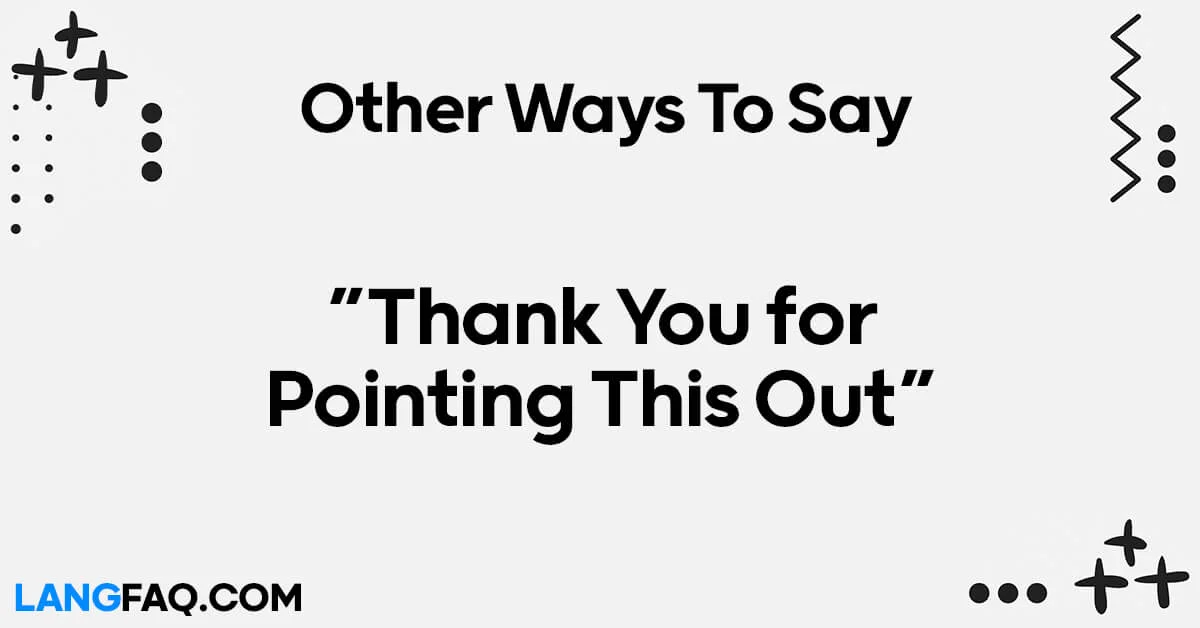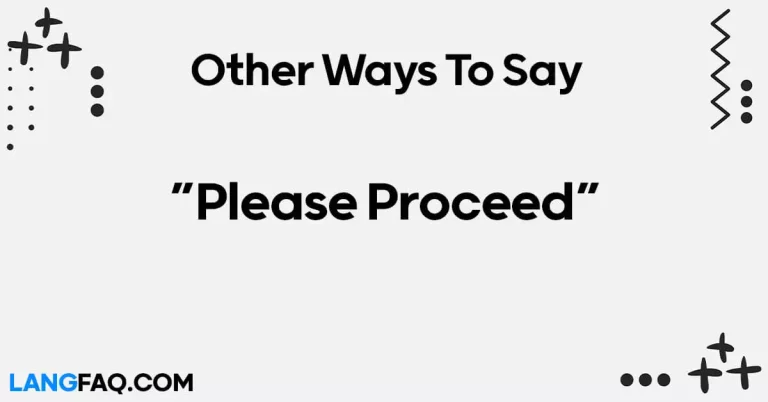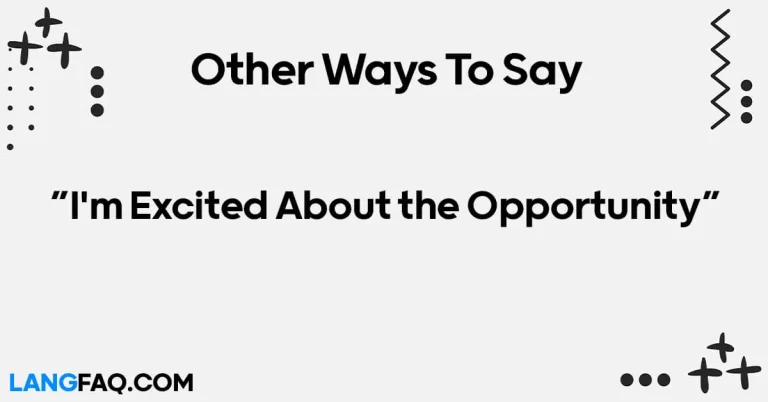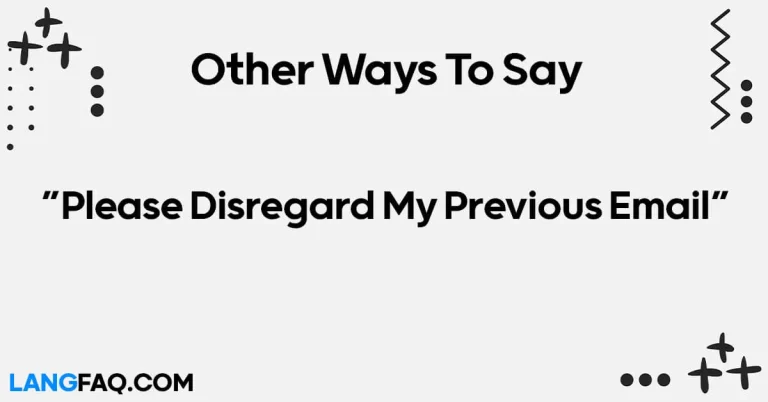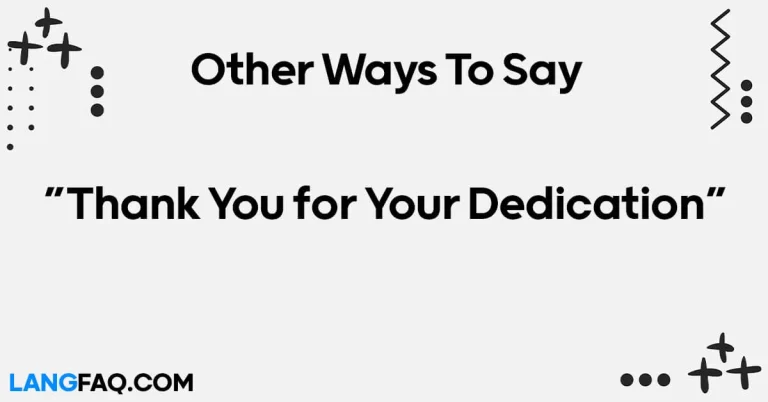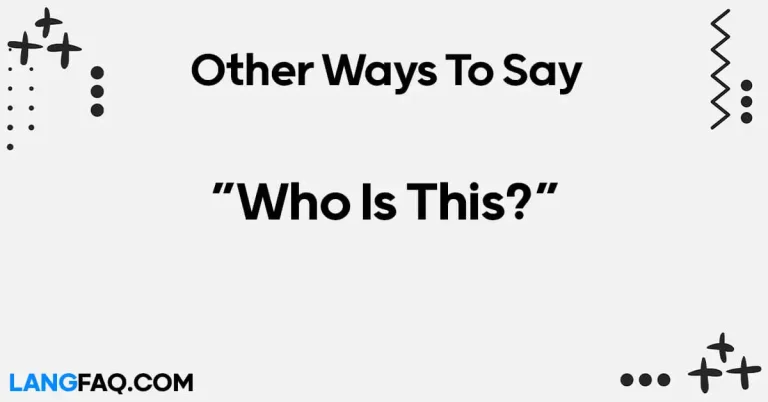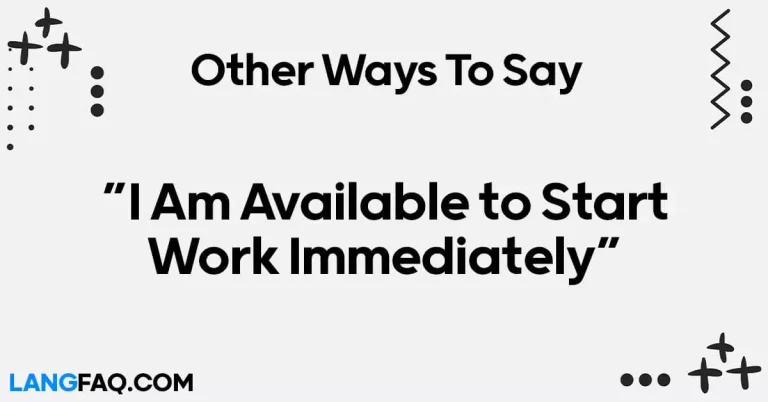In the realm of communication, expressing gratitude goes a long way in building strong connections. When someone points something out to us, whether it’s a helpful suggestion or a correction, acknowledging their effort is crucial. “Thank you for pointing this out” is a common phrase, but expanding your vocabulary with diverse expressions can add depth to your interactions. Let’s explore 12 uplifting ways to convey appreciation for someone’s guidance or correction.
12 Other Ways to Say “Thank You for Pointing This Out”
Here are 12 other ways to say “Thank you for pointing this out”:
- Thank you for bringing this to my attention.
- I appreciate you noticing that.
- Thanks for flagging this for me.
- I’m grateful you pointed this out.
- Thank you for highlighting this.
- I’m thankful you brought this to my notice.
- Thanks for alerting me to this.
- I’m appreciative of your observation.
- Thank you for drawing my attention to this.
- I’m indebted to you for pointing this out.
- Thanks for making me aware of this.
- I’m thankful for your keen eye in spotting this.
Here’s the table with meanings and examples, followed by a short conclusion:
| Expression | Meaning | Example |
|---|---|---|
| Thank you for bringing this to my attention. | Acknowledging someone’s notification or alert. | “Thank you for bringing this to my attention. I hadn’t noticed it before.” |
| I appreciate you noticing that. | Expressing gratitude for someone’s observation. | “I appreciate you noticing that mistake. It’s important to catch those errors.” |
| Thanks for flagging this for me. | Thanking someone for highlighting an issue. | “Thanks for flagging this for me. Let’s address it right away.” |
| I’m grateful you pointed this out. | Expressing gratitude for someone’s correction or input. | “I’m grateful you pointed this out. It’s crucial for our project.” |
| Thank you for highlighting this. | Appreciating someone’s emphasis on a particular point. | “Thank you for highlighting this issue. Let’s discuss it further.” |
| I’m thankful you brought this to my notice. | Showing appreciation for someone’s notification. | “I’m thankful you brought this to my notice. Let’s find a solution.” |
| Thanks for alerting me to this. | Thanking someone for making them aware of something. | “Thanks for alerting me to this problem. Let’s investigate.” |
| I’m appreciative of your observation. | Expressing gratitude for someone’s insight. | “I’m appreciative of your observation. It’s insightful.” |
| Thank you for drawing my attention to this. | Acknowledging someone’s effort to bring something to their attention. | “Thank you for drawing my attention to this issue. Let’s address it.” |
| I’m indebted to you for pointing this out. | Expressing deep gratitude for someone’s help or correction. | “I’m indebted to you for pointing this out. I couldn’t have done it without you.” |
| Thanks for making me aware of this. | Showing appreciation for someone informing them of something. | “Thanks for making me aware of this issue. Let’s work on a solution.” |
| I’m thankful for your keen eye in spotting this. | Appreciating someone’s attention to detail. | “I’m thankful for your keen eye in spotting this mistake. It’s important to catch these early.” |
These alternative expressions provide a diverse range of ways to express gratitude for someone’s guidance, correction, or notification. Using these variations can enhance communication and foster positive relationships by showing appreciation for others’ contributions and observations.
Is It Correct to Say “Thank You for Pointing This Out”?
Yes, “Thank you for pointing this out” is a grammatically correct and commonly used phrase in English. It is a polite way to express appreciation for someone bringing something to your attention, such as a mistake, issue, or important detail. This phrase acknowledges the other person’s effort and contribution to helping you become aware of the matter, demonstrating gratitude and respect for their input.
You can use this phrase in various contexts, both formal and informal, such as:
- In professional settings: During meetings, discussions, or email correspondence when someone alerts you to an error, discrepancy, or relevant information.
- In personal interactions: When a friend, family member, or acquaintance notifies you about something important or noteworthy.
Overall, “Thank you for pointing this out” is a versatile expression that conveys appreciation and fosters positive communication and collaboration.
Professional Mail Example With “Thank You for Pointing This Out”
Subject: Correction Made – Thank You for Pointing This Out
Dear [Recipient’s Name],
I hope this email finds you well.
I wanted to extend my sincere gratitude for bringing [specific issue or error] to my attention.
Your keen observation and proactive approach truly helped us maintain the quality and accuracy of our work.
Upon receiving your feedback, our team swiftly rectified the situation by [briefly describe the corrective action taken].
Rest assured, we are committed to upholding the highest standards and ensuring such oversights are minimized in the future.
Your dedication to excellence and commitment to collaboration are greatly appreciated.
Please feel free to reach out if you notice any further discrepancies or have any suggestions for improvement.
Your input is invaluable to us. Once again, thank you for your vigilance and for contributing to our collective success.
Warm regards,
[Your Name]
[Your Position]
[Your Contact Information]
Thank You for Bringing This to My Attention
Expressing gratitude for someone’s proactive approach in notifying you about something is essential for maintaining open communication and fostering a collaborative environment. This phrase can be used in both formal and informal contexts to show appreciation for someone’s vigilance and attention to detail.
Scenario:
Imagine you’re working on a project with a team, and one of your colleagues notices a mistake in the presentation slides that could potentially affect the outcome of the project. You can use this phrase to thank them for bringing it to your attention and preventing any further issues.
Example Sentence:
“Thank you for bringing this to my attention. I appreciate your thoroughness in reviewing the slides.”
Variations:
- Formal: “I’m grateful you caught that error. Your attention to detail is commendable.”
- Informal: “Thanks for spotting that mistake! I wouldn’t have caught it without you.”
Email Sample:
Subject: Appreciation for Notifying About the Error
Dear [Colleague’s Name],
I wanted to extend my sincere thanks to you for bringing [specific issue] to my attention earlier. Your keen eye for detail and proactive approach are truly appreciated. Thanks to your vigilance, we were able to address the issue promptly and ensure the success of the project.
Once again, thank you for your diligence and commitment to excellence.
Best regards, [Your Name]
I Appreciate You Noticing That
Acknowledging someone’s observation with gratitude is a simple yet powerful way to validate their input and encourage open communication. This phrase can be used in various contexts, from professional settings to personal interactions, to express appreciation for someone’s attention to detail.
Scenario:
Suppose you’re in a meeting discussing a proposal, and a colleague points out a potential flaw in the plan that you hadn’t noticed before. You can use this phrase to show gratitude for their insight and reinforce their contribution to the discussion.
Example Sentence:
“I appreciate you noticing that detail. Your input is invaluable in refining our proposal.”
Variations:
- Formal: “Thank you for bringing that to my attention. Your keen observation skills are invaluable.”
- Informal: “Thanks for catching that! I didn’t even realize it until you mentioned it.”
Email Sample:
Subject: Gratitude for Your Observation
Dear [Colleague’s Name],
I wanted to take a moment to express my gratitude for your recent input during our meeting. Your keen observation skills and attention to detail are truly commendable, and I appreciate you noticing [specific detail]. Your contribution has undoubtedly strengthened our proposal and will contribute to its success.
Thank you once again for your valuable input.
Warm regards, [Your Name]
Thanks for Flagging This for Me
Acknowledging someone’s effort in bringing an issue to your attention is essential for fostering a culture of transparency and collaboration. This phrase can be used in professional settings to express gratitude for someone’s proactive approach in identifying potential problems or areas for improvement.
Scenario:
Imagine you’re reviewing a report before submitting it to your supervisor, and a colleague notices a discrepancy in the data. You can use this phrase to thank them for flagging the issue and preventing any errors from going unnoticed.
Example Sentence:
“Thanks for flagging this for me. Your attention to detail is invaluable in ensuring the accuracy of our reports.”
Variations:
- Formal: “I appreciate your diligence in identifying this issue. Your proactive approach is commendable.”
- Informal: “Thanks for catching that! I almost missed it.”
Email Sample:
Subject: Appreciation for Bringing the Issue to My Attention
Dear [Colleague’s Name],
I wanted to extend my sincere thanks to you for flagging [specific issue] in the report earlier. Your attention to detail and proactive approach are truly appreciated, and thanks to your vigilance, we were able to address the issue before submitting the report.
Thank you once again for your dedication to maintaining quality standards.
Best regards, [Your Name]
I’m Grateful You Pointed This Out
Expressing gratitude for someone’s correction or input is crucial for fostering a positive and collaborative environment. This phrase can be used in various contexts, from professional settings to personal interactions, to show appreciation for someone’s honesty and willingness to help.
Scenario:
Suppose you’re discussing a project with a colleague, and they notice a potential flaw in your approach. You can use this phrase to thank them for pointing it out and demonstrating your openness to feedback.
Example Sentence:
“I’m grateful you pointed this out. Your insights are valuable in improving our project.”
Variations:
- Formal: “Thank you for bringing this to my attention. Your expertise in this area is highly valued.”
- Informal: “Thanks for letting me know! I’ll make sure to address it.”
Email Sample:
Subject: Appreciation for Your Input
Dear [Colleague’s Name],
I wanted to express my gratitude for your recent input regarding [specific issue]. Your keen observation and willingness to share your insights are truly appreciated, and I’m grateful you pointed out the potential flaw in our approach. Your contribution will undoubtedly lead to a better outcome for our project.
Thank you once again for your valuable input.
Best regards, [Your Name]
Thank You for Highlighting This
Expressing gratitude for someone’s emphasis on a particular point demonstrates attentiveness and respect for their insight. This phrase can be used to acknowledge someone’s effort in drawing attention to an important aspect of a discussion or situation.
Scenario:
Imagine you’re in a brainstorming session, and a team member highlights a critical aspect of the project that others may have overlooked. You can use this phrase to thank them for bringing it to everyone’s attention and ensuring it receives proper consideration.
Example Sentence:
“Thank you for highlighting this key point. Your contribution adds clarity to our discussion.”
Variations:
- Formal: “I appreciate your emphasis on this issue. It’s essential for our decision-making process.”
- Informal: “Thanks for pointing that out! It’s an important detail to consider.”
Email Sample:
Subject: Appreciation for Emphasizing the Key Point
Dear [Team Member’s Name],
I wanted to express my gratitude for your emphasis on [specific point] during our recent brainstorming session. Your insight and attention to detail are invaluable in ensuring that we consider all aspects of the project thoroughly. Thank you for highlighting this key point and contributing to our collective understanding.
Best regards, [Your Name]
I’m Thankful You Brought This to My Notice
Expressing gratitude for someone’s proactive approach in bringing something to your notice shows humility and openness to feedback. This phrase can be used to acknowledge someone’s effort in ensuring you are aware of a situation or issue.
Scenario:
Suppose you’re preparing for a presentation, and a colleague notices a potential error in one of your slides. You can use this phrase to thank them for bringing it to your attention and preventing any embarrassment during the presentation.
Example Sentence:
“I’m thankful you brought this to my notice. Your attention to detail is appreciated.”
Variations:
- Formal: “Thank you for drawing my attention to this matter. Your diligence is commendable.”
- Informal: “Thanks for letting me know! I’ll make sure to fix it before the presentation.”
Email Sample:
Subject: Gratitude for Bringing the Issue to My Attention
Dear [Colleague’s Name],
I wanted to extend my sincere thanks to you for bringing [specific issue] to my notice earlier. Your vigilance and proactive approach are truly appreciated, and thanks to your timely intervention, we were able to address the issue before it became a problem.
Thank you once again for your dedication to ensuring the success of our presentation.
Warm regards, [Your Name]
Thanks for Alerting Me to This
Acknowledging someone’s effort in alerting you to a situation or issue is crucial for maintaining effective communication and addressing problems promptly. This phrase can be used to express gratitude for someone’s prompt action in notifying you about something important.
Scenario:
Imagine you’re working on a project, and a team member notices a potential risk that could affect the timeline. You can use this phrase to thank them for alerting you to the issue and taking proactive steps to mitigate it.
Example Sentence:
“Thanks for alerting me to this potential risk. Your quick action is appreciated.”
Variations:
- Formal: “I appreciate your prompt notification of this issue. Your vigilance is commendable.”
- Informal: “Thanks for giving me a heads up! Let’s address it before it becomes a problem.”
Email Sample:
Subject: Appreciation for Your Prompt Notification
Dear [Team Member’s Name],
I wanted to express my gratitude for your prompt notification regarding [specific issue]. Your quick action and attention to detail are truly commendable, and thanks to your vigilance, we were able to address the issue before it escalated.
Thank you once again for your dedication to ensuring the success of our project.
Best regards, [Your Name]
I’m Appreciative of Your Observation
Expressing appreciation for someone’s observation shows respect for their insight and contribution to the discussion. This phrase can be used to acknowledge someone’s effort in bringing attention to a particular detail or aspect of a situation.
Scenario:
Suppose you’re in a team meeting discussing a project plan, and a colleague points out a potential issue with the timeline. You can use this phrase to thank them for their observation and validate their input.
Example Sentence:
“I’m appreciative of your observation. Your input will help us refine our project plan.”
Variations:
- Formal: “Thank you for your keen observation. Your insights are invaluable in ensuring project success.”
- Informal: “Thanks for noticing that! It’s something we need to address.”
Email Sample:
Subject: Appreciation for Your Observation
Dear [Colleague’s Name],
I wanted to express my appreciation for your recent observation regarding [specific issue]. Your keen eye for detail and proactive approach are truly commendable, and I’m grateful for your contribution to our discussion. Your insight will undoubtedly help us refine our project plan and achieve our goals.
Thank you once again for your valuable input.
Warm regards, [Your Name]
Thank You for Drawing My Attention to This
Acknowledging someone’s effort in drawing your attention to a matter demonstrates openness to feedback and a willingness to learn. This phrase can be used to express gratitude for someone’s proactive approach in ensuring you are aware of a situation or issue.
Scenario:
Imagine you’re reviewing a document, and a colleague notices a typo that you missed. You can use this phrase to thank them for bringing it to your attention and demonstrating your willingness to make corrections.
Example Sentence:
“Thank you for drawing my attention to this mistake. I’ll make sure to correct it before finalizing the document.”
Variations:
- Formal: “I appreciate your diligence in identifying this error. Your attention to detail is commendable.”
- Informal: “Thanks for letting me know! I’ll fix it right away.”
Email Sample:
Subject: Gratitude for Notifying Me About the Error
Dear [Colleague’s Name],
I wanted to extend my sincere thanks to you for drawing my attention to [specific issue] in the document earlier. Your attention to detail and proactive approach are truly appreciated, and thanks to your vigilance, we were able to correct the error before finalizing the document.
Thank you once again for your dedication to ensuring quality standards.
Best regards, [Your Name]
I’m Indebted to You for Pointing This Out
Expressing deep gratitude for someone’s help or correction demonstrates humility and a willingness to learn and grow. This phrase can be used to acknowledge someone’s effort in pointing out a mistake or oversight.
Scenario:
Suppose you’re working on a project, and a mentor identifies a flaw in your approach. You can use this phrase to thank them for their guidance and demonstrate your commitment to improving.
Example Sentence:
“I’m indebted to you for pointing this out. Your guidance has been invaluable in helping me grow.”
Variations:
- Formal: “Thank you for bringing this to my attention. Your mentorship has been instrumental in my development.”
- Informal: “Thanks for letting me know! I’ll make sure to improve.”
Email Sample:
Subject: Gratitude for Your Mentorship
Dear [Mentor’s Name],
I wanted to express my heartfelt gratitude to you for pointing out [specific issue] in my work. Your mentorship and guidance have been invaluable in helping me navigate challenges and grow both personally and professionally. I’m truly indebted to you for your support and insight.
Thank you once again for your unwavering commitment to my development.
Warm regards, [Your Name]
Thanks for Making Me Aware of This
Expressing gratitude for someone making you aware of a situation or issue shows humility and a willingness to learn. This phrase can be used to acknowledge someone’s effort in ensuring you are informed about something important.
Scenario:
Imagine you’re in a team meeting, and a colleague informs you about a policy change that affects your project. You can use this phrase to thank them for keeping you informed and demonstrating your openness to staying updated.
Example Sentence:
“Thanks for making me aware of this change. It’s important for us to adapt our plans accordingly.”
Variations:
- Formal: “I appreciate your prompt notification of this change. Your proactive approach is commendable.”
- Informal: “Thanks for letting me know! I’ll make sure to adjust our plans.”
Email Sample:
Subject: Appreciation for Keeping Me Informed
Dear [Colleague’s Name],
I wanted to extend my sincere thanks to you for making me aware of [specific change] earlier. Your proactive approach and attention to detail are truly appreciated, and thanks to your timely notification, we can adjust our plans accordingly.
Thank you once again for your dedication to keeping our team informed.
Best regards, [Your Name]
I’m Thankful for Your Keen Eye in Spotting This
Expressing gratitude for someone’s attention to detail and ability to spot mistakes or issues demonstrates appreciation for their contribution to maintaining quality standards. This phrase can be used to acknowledge someone’s effort in identifying errors or discrepancies.
Scenario:
Suppose you’re reviewing a document, and a colleague points out a formatting inconsistency that you missed. You can use this phrase to thank them for their keen observation and attention to detail.
Example Sentence:
“I’m thankful for your keen eye in spotting this mistake. Your attention to detail ensures the quality of our work.”
Variations:
- Formal: “Thank you for bringing this to my attention. Your meticulousness is invaluable in maintaining quality standards.”
- Informal: “Thanks for catching that! It’s important to have someone eagle-eyed on the team.”
Email Sample:
Subject: Gratitude for Noticing the Error
Dear [Colleague’s Name],
I wanted to express my gratitude to you for spotting [specific issue] in the document earlier. Your attention to detail and keen eye for discrepancies are truly commendable, and thanks to your vigilance, we can ensure the quality and accuracy of our work.
Thank you once again for your dedication to excellence.
Warm regards, [Your Name]
Conclusion
In conclusion, expressing gratitude for someone’s guidance is not only polite but also essential for fostering positive relationships. By diversifying your expressions of thanks and recognizing the value of their input, you create a culture of appreciation and respect. So, the next time someone points something out to you, remember to say “Thank you” in one of these uplifting ways.
FAQs
Q: How can I express gratitude without sounding repetitive? A: You can vary your expressions of gratitude by using alternative phrases like “I appreciate your help” or “Thanks for bringing that to my attention.”
Q: Is it important to express gratitude in professional settings? A: Yes, expressing gratitude in professional settings is crucial for building positive work relationships and fostering a collaborative environment.
Q: What if I’m not sure how to express gratitude in a specific situation? A: When in doubt, a simple “Thank you for your guidance” or “I appreciate your input” is always a safe and respectful way to express gratitude.
Q: Can I use informal expressions of thanks in professional settings? A: While it’s essential to maintain professionalism, using informal expressions of thanks like “Thanks for pointing that out” can still convey appreciation in a casual yet respectful manner.
Q: How can I cultivate a habit of expressing gratitude regularly? A: Practice gratitude by making a conscious effort to thank others for their guidance or assistance daily. Over time, expressing appreciation will become a natural part of your communication style.
Q: Is it appropriate to express gratitude for constructive criticism? A: Absolutely! Expressing gratitude for constructive criticism shows humility and a willingness to learn and grow. Saying “Thank you for your feedback” acknowledges the value of their input.

